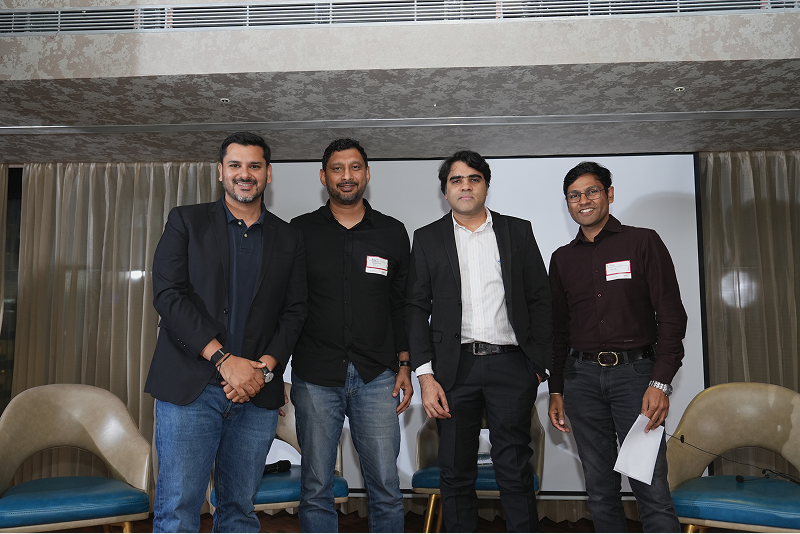Trust, Scale, and the Future of AI in Healthcare
Yash Gokhroo
Sep 09, 2025

Healthcare is one of the most mission-critical yet operationally intensive industries in the world. Globally, it represents nearly 10% of GDP, and in the U.S. alone, spending has crossed $4.9 trillion. Yet despite this massive spend, systems remain labour-heavy and inefficient – doctors spend almost two hours on documentation for every one hour with patients, and the U.S. faces a projected shortage of 3.2 million healthcare workers by 2026. In India, the access gap is equally stark: we have 1 doctor for every 1,400 people, below the WHO’s 1:1,000 benchmark.
This operational intensity is exactly why AI in healthcare is such an exciting space. Unlike earlier healthtech revolutions, the pace of adoption today is strikingly different. It took EMRs like Epic and Cerner nearly a decade to gain traction in the U.S., despite federal mandates and billions in subsidies. By contrast, AI-native tools like Abridge, which provide ambient scribing for clinicians, have achieved widespread adoption in just four years. This signals a structural shift – AI is being pulled into workflows because the value is immediate and tangible.
On 12th August 2025, Chiratae Ventures, in collaboration with AWS, hosted an AI in Healthcare mixer for founders and operators building in this space. The evening brought together entrepreneurs, investors, and operators with one shared goal: to explore how AI can reshape care delivery.
In the lead-up, we asked founders to share their toughest questions, and what emerged was a candid window into the challenges of building in this space. Trust was the dominant theme. How can AI systems earn the confidence of doctors, patients, and regulators? Whether in diagnostics, claims processing, or mental health, adoption ultimately hinges on reliability and safety. Regulation was another pressing concern, with founders wondering how to navigate India’s evolving laws while still ensuring that their products could meet global standards. Data access and bias also surfaced repeatedly, with the challenge of building AI that is fair and representative across diverse populations. For many, affordability and scale loomed large: could AI bring preventive care and quality diagnostics to underserved populations at prices they could actually pay? Finally, there was the matter of business sustainability – how to design models that are both viable and impactful in a sector notorious for complex incentives.
These questions framed a lively panel discussion moderated by Gopi Pepakayala (AWS) with Ranjith Menon (Chiratae Ventures), Nilav Ghosh (Innovaccer), and Tushar Vashisht (HealthifyMe).
Tushar highlighted India’s rapid consumer adoption of digital health. HealthifyMe’s AI coaches, for example, have gained traction because they deliver actionable, personalised guidance at a fraction of the cost of human coaching. He noted that India already sees over 300 million health and fitness app downloads annually, proof that trust in digital health is far greater than assumed. For him, the equation is simple: access plus affordability equals trust – and that is driving AI adoption faster than expected.
Ranjith brought the investor perspective. He stressed that the true moat for AI startups lies not just in the problem but in the teams capable of solving it. He pointed to the example of AI scribes, which scaled in just four years compared to EMRs that took nearly a decade. He also emphasized the size of the opportunity: the U.S. spends nearly $1 trillion annually on administrative costs, about 25% of total healthcare spend. For startups, this inefficiency represents a massive market where AI can automate workflows and return time back to clinicians.
Nilav offered a global lens. Since 2020, the FDA has approved over 300 AI-driven medical devices, a pace that underscores how quickly the regulatory landscape is evolving. He shared that ambient scribing tools globally are already saving doctors up to three hours a day, a direct antidote to burnout and a way to see more patients without sacrificing quality. For India, he sees huge potential in building robust “agentic architectures” that can automate workflows end-to-end, from administration to clinical support.
The discussions reaffirmed one key point:
AI in healthcare is not just about technology. It is about earning trust, navigating regulation, ensuring equity, and designing business models that can scale responsibly. But the potential value creation is immense – AI can address labour shortages, reduce inefficiencies, and make care more accessible and affordable.
AI in healthcare is not just about technology. It is about earning trust, navigating regulation, ensuring equity, and designing business models that can scale responsibly. But the potential value creation is immense – AI can address labour shortages, reduce inefficiencies, and make care more accessible and affordable.
At Chiratae Ventures, we have seen firsthand how bold founders can reshape the healthcare landscape. From preventive health to AI-driven claims processing, we believe the coming decade will see healthcare transformed at every level of the value chain.
This time, it truly feels different. The adoption curve is steeper, the regulatory openness is greater, and the demand for scalable solutions is undeniable. We are excited to back the next generation of entrepreneurs who will not only innovate but also reimagine healthcare delivery for India and the world. If you are building in this space, we would love to hear from you. Together, let’s shape the future of healthcare.
If you are building in this space, write to yash@chiratae.com
